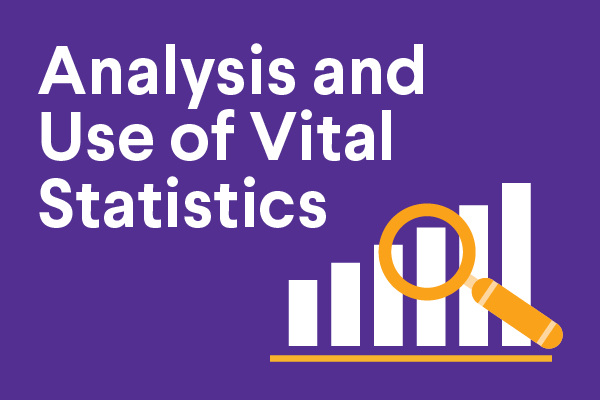This module forms part of a course on the analysis and use of vital
statistics and is available in English, Français, Português, and
Español.
Accurate civil registration and vital statistics (CRVS) data are critical to understanding national health status and developing appropriate strategies and relevant policies to improve population health. In the absence of CRVS data, countries lack a clear picture of birth and death rates and the causes of death. This data gap makes it difficult to allocate resources appropriately to health, education, and other key government sectors. As part of the Bloomberg Philanthropies Data for Health Initiative, countries around the world are investing in expanding and improving the quality of the CRVS systems. However, unless data are regularly analyzed and used, neither government nor citizens will not reap the benefits of this investment. Vital statistics generated by well-functioning civil registration systems are crucial for policy development and decision-making and are central to monitoring several Sustainable Development Goal (SDG) targets. Here in Module 1 of 12, you'll get an overview of CRVS and the social and health benefits from high-quality data from civil registration records. Participants will learn about the public health uses of data from CRVS systems, including developing public health policies, monitoring health systems, and evaluating public health programs. Upon completion of the module, participants will understand how to define civil registration and vital statistics, the types of vital records recognized by the UN, and both the challenges and benefits of CRVS systems.
Accurate civil registration and vital statistics (CRVS) data are critical to understanding national health status and developing appropriate strategies and relevant policies to improve population health. In the absence of CRVS data, countries lack a clear picture of birth and death rates and the causes of death. This data gap makes it difficult to allocate resources appropriately to health, education, and other key government sectors. As part of the Bloomberg Philanthropies Data for Health Initiative, countries around the world are investing in expanding and improving the quality of the CRVS systems. However, unless data are regularly analyzed and used, neither government nor citizens will not reap the benefits of this investment. Vital statistics generated by well-functioning civil registration systems are crucial for policy development and decision-making and are central to monitoring several Sustainable Development Goal (SDG) targets. Here in Module 1 of 12, you'll get an overview of CRVS and the social and health benefits from high-quality data from civil registration records. Participants will learn about the public health uses of data from CRVS systems, including developing public health policies, monitoring health systems, and evaluating public health programs. Upon completion of the module, participants will understand how to define civil registration and vital statistics, the types of vital records recognized by the UN, and both the challenges and benefits of CRVS systems.
